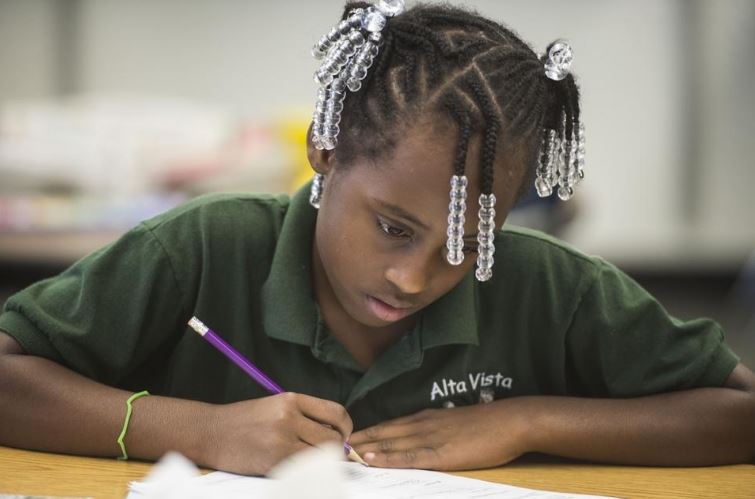Summer Learning Academies help students prepare
/By Lance Arney
Posted with permission of the Herald-Tribune Media Group

For most children, summer is a vacation from school. However, for some children summer can also mean the absence of structured learning opportunities, causing a “summer slide” as they lose learning gains made during the school year and return in the fall behind their peers.
Children from low-income families are most vulnerable to summer slide because their parents cannot afford or access the same kinds of educational resources, programs and activities as middle- and upper-income families. “As a result,” concludes the National Center for Summer Learning at Johns Hopkins University, “they experience well-documented setbacks in academic skills that contribute to growth in the achievement gap.” Research shows that low-income children can lose up to two months of reading achievement during the summer.
Due to disparities in resources and opportunities for learning, the achievement gap begins before kindergarten. “By age 3, children from wealthier families typically have heard 30 million more words than children from low-income families,” notes a report by the Annie E. Casey Foundation. With exposure to fewer words, most children from low-income families enter kindergarten behind their peers and less prepared for school.
To address the dual issues of disparities in kindergarten readiness and summer slide for our local children, the Sarasota County School District started Summer Learning Academies (SLAs) at Alta Vista, Emma E. Booker, Gocio and Tuttle — four elementary schools where more than 90 percent of students are eligible for free or reduced-price school meals.
This six-week academic and enrichment summer program is offered at no cost to parents, thanks to funding by the district, the Community Foundation of Sarasota County and partner organizations.
When the SLAs were first implemented, the goal was merely to prevent summer learning loss. But at Alta Vista, where the SLA model began in 2012, not only did SLAs prevent summer slide and help students become more prepared for school, but some grade-level cohorts of SLA students made learning gains.
SCOPE, in partnership with the school district and Community Foundation, looked at the impact of last year’s SLAs on the reading performance of students.
With data provided by the district, SCOPE analyzed the students’ reading scores from iReady Diagnostic, an assessment used by the schools to track academic growth and performance.
We found that kindergartners who participated in the SLAs, at all four schools, on average scored higher than kindergartners at these schools who did not participate. The SLA students achieved the equivalent of the academic growth that would occur with 6.4 weeks of reading instruction.
Furthermore, we see a pattern of academic growth in reading for students participating in SLAs at Alta Vista, where, in 2016, the academies were available for students entering kindergarten up to third grade. First-graders and third-graders in the SLAs at Alta Vista on average achieved the equivalent of approximately 4.5 and 4 weeks, respectively, of academic growth in reading. Second-graders were a particularly high-performing cohort: On average, they achieved 34.3 weeks of growth.
SLAs also have had a positive impact on overall school readiness. School principals and teachers report that their SLA kindergartners started the school year more confident and familiar with school routines.
It’s easy to see why SLAs have been so successful.
The SLAs engage students with instructional time devoted to reading and math. Students get breakfast and lunch, receive free books, and participate in hands-on learning activities devoted to art, science, and social- and emotional-skill development. Field trips take them to Mote Marine Laboratory, Ringling Museum of Art, Sarasota Jungle Gardens, South Florida Museum, Riverview Planetarium, and Van Wezel Performing Arts Hall. And the students’ parents are students themselves in Parent University classes that help them become more engaged in their children’s learning.
At Alta Vista, students entering kindergarten to grade three are eligible to attend. Now in its second year at Emma E. Booker, Gocio, and Tuttle, all students entering kindergarten and first grade are eligible. A total of 501 students are enrolled in the SLAs this summer, with almost as many parents attending Parent University classes.
The fact that the Summer Learning Academies produced measurable improvements across four different sites (Alta Vista, Emma E. Booker, Gocio and Tuttle), as well as four different grade levels (at Alta Vista), shows that these models are already making a positive impact on academic achievement.
As we continue to monitor results, we hope to build on these models and identify the students in our community who need them the most. The results so far are great, but increasing participation is key to making an even greater impact.
Lance Arney is interim executive director of SCOPE and a research consultant to the Community Foundation of Sarasota County. He holds a doctorate in applied anthropology from the University of South Florida.